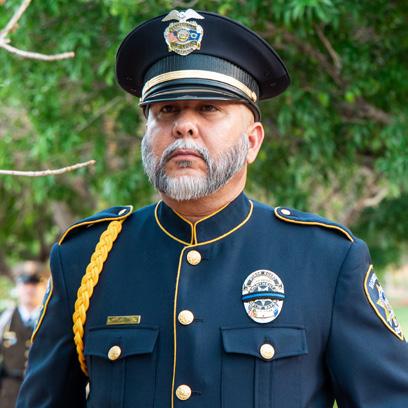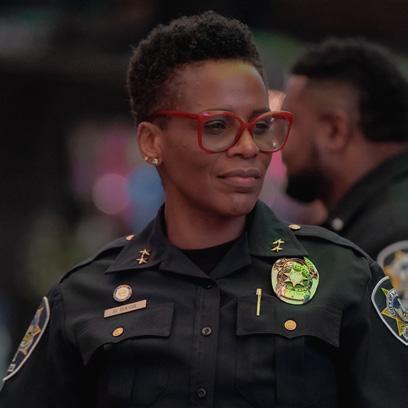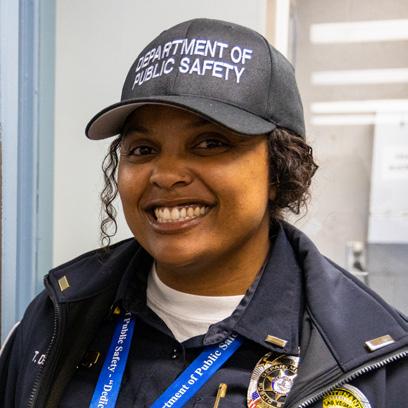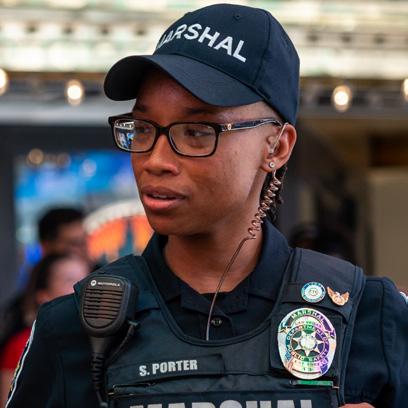






The Officer Wellness In-Service Training was introduced in August 2025 as the first mandatory wellness course for all department sworn personnel. A total of 265 sworn staff attended, marking a milestone in the department’s proactive approach to employee wellness.
This course was a curriculum developed by the Behavioral Health Administrator to satisfy the requirements of AB336, which mandates annual wellness-related education for law enforcement personnel. The curriculum was carefully designed not only to meet compliance standards, but also to be meaningful, relevant and practical for officers.




This module highlighted the alarming rates of officer suicide compared to line-of-duty deaths, underscoring the urgent need for awareness. Officers were taught to recognize early warning signs in themselves and their peers, such as withdrawal, hopelessness, or sudden mood changes. The session emphasized intervention strategies, including how to ask direct questions, reduce stigma and connect a peer to immediate support. Departmental and national resources (such as peer support, chaplains and copline) were reviewed to reinforce the message that help is always available.
This section addressed the psychological impact of repeated exposure to trauma in law enforcement and corrections. Officers learned the difference between post-traumatic stress injury (PTSI) and post- traumatic stress disorder (PTSD), reinforcing the idea that trauma-related reactions are not a weakness but a natural human response to abnormal events. Practical tools were shared for identifying symptoms (hypervigilance, avoidance, intrusive thoughts, emotional numbing) and for beginning recovery through peer support, counseling and resilience-based strategies.
Recognizing that law enforcement stress doesn’t end when officers clock out, this module focused on relationship survival strategies. Officers explored how shift work, emotional detachment, and accumulated stress can strain marriages and family dynamics. Group discussion centered on practical approaches for healthy communication, setting boundaries, and maintaining connection at home. Officers were encouraged to see their families as partners in wellness and were introduced to resources designed for family support, including workshops and counseling opportunities.




This module equipped officers with practical, usable tools they could apply immediately both on duty and off. Techniques included controlled breathing, grounding exercises, reframing thoughts and the use of physical activity as stress relief. Officers were encouraged to recognize maladaptive coping (such as substance use, isolation or irritability) and replace these with healthier alternatives. Emphasis was placed on the idea that resiliency is a skill set, one that requires practice and intentional effort.
This section spotlighted the role of the Peer Support Team, chaplains and behavioral health resources available within the department. Officers learned how to access peer support confidentially, when to involve chaplains, and what external clinical/community supports exist for specialized care. By reinforcing that officers do not have to face challenges alone, this segment aimed to build trust and normalize reaching out for help. The importance of peer-to-peer connection was highlighted as a frontline defense in reducing stigma and increasing resource utilization.

• 265 participants trained across the department
• 100% participation – all required personnel completed the course
• This was the first time wellness training was made mandatory, and full participation ensured that every member of the department, across both DCM and CO assignments, received consistent exposure to the same wellness principles. This unified approach strengthens department-wide culture change and reduces stigma around discussing mental health.
• The experiential format ensured active engagement, making the class more impactful than traditional lecture-based instruction.
• Officers participated in group discussions about real-life stressors.
• Interactive exercises helped model and normalize difficult conversations.
• Peer sharing reinforced connection and trust within the department.
With full department participation, the foundation has been set for wellness to remain a consistent and mandatory element of future in- service training.

Feedback from anonymous evaluations reflected overwhelmingly positive responses. Generalized across all 265 attendees, several consistent themes emerged:
Greater Awareness & Reflection: Officers reported the training made them stop and think about how their health, stress, and wellness habits impact their work and family.
Daily Application: Participants noted the course helped them evaluate what changes they could make in their everyday lives.
Validation & Support: Many expressed appreciation that the department prioritized mental health, stating it showed the department truly cares.
Recognition of Stressors: Officers gained greater understanding of the unique stressors affecting law enforcement and corrections staff.
Professional & Personal Value: Officers stated the course benefited both their professional roles and personal/family lives.






• 265 Officers & Staff Trained (first mandatory class)
• 95%+ Rated “Above Average” for course quality, relevance, and instruction
• 90%+ Reported Personal Benefit – reflection on health, stress and coping strategies
• 85%+ Reported Professional Benefit – improved recognition of stressors, resource awareness and peer support tools

Key Takeaway: Nearly every officer indicated the training was beneficial in both personal and professional life, validating the need for continued mandatory wellness education.

“The class made me stop and think about how my health may be affecting my work and family.”
“This course helps me evaluate the things I can do better in my daily life.”
“It helps knowing someone in the department cares about our mental health.”
“This training will benefit me in my personal life as well as professionally.”
“I gained better recognition and understanding of the stressors that affect officers.”







The inaugural mandatory Officer Wellness In-Service Training was a success, with strong engagement and consistent feedback reflecting its value. Officers left with greater awareness, practical coping strategies and reassurance that the department is invested in their well-being. The discussion-based, participatory format proved highly effective in creating a safe space for difficult conversations around mental health.
Officer Wellness should remain a permanent component of mandatory annual inservice training. Future sessions should expand on advanced coping skills, family wellness, and trauma recovery strategies. In addition, this training should be inclusive of dispatchers, recognizing their critical role in emergency response and the significant stressors unique to their position. Including dispatchers will strengthen departmentwide resilience, ensure consistent access to resources and reinforce that wellness is a shared responsibility across all public safety roles.